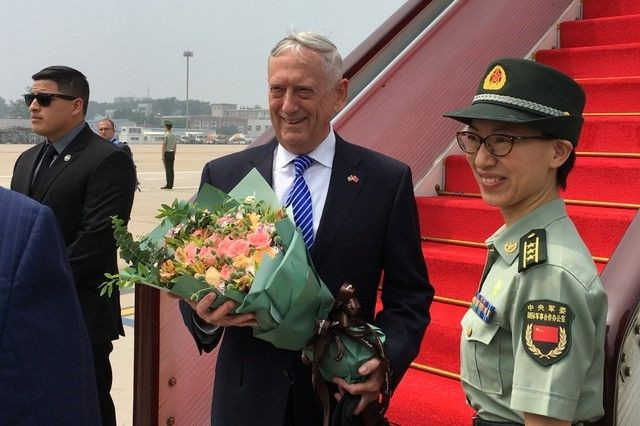China, US Strike Positive Tone In Mattis Defense Talks

Defense Secretary Jim Mattis kicked off talks in China on Wednesday that he and his Chinese counterpart described as "open and honest," seeking to strike a positive tone despite Sino-United States tensions over trade and the South China Sea.
Mattis, the first Pentagon chief to visit China since 2014, told Chinese Defence Minister Wei Fenghe that he expected all of his conversations in Beijing would be characterized by an "open and honest" dialogue, like the one he had with Wei.
"I'm here because of the importance that we in the U.S. military place on the military-to-military relationship with the PLA," Mattis said, referring to the People's Liberation Army.
"The military to military relationship is critical to the broader relationship between our two countries."
Mattis also invited Wei to visit him at the Pentagon.
Wei was similarly upbeat.
"Your visit to China this time is ... a new positive factor to the military-to-military and state-to-state relationship," Wei said.
Wei, who only assumed his position in March, noted a goal outlined by Chinese President Xi Jinping and U.S. President Donald Trump "to increase the strategic trust" between the United States and China.
"Indeed it will be significant for us to further build our strategic confidence and even cooperation," he said.
Later in the day, Mattis will meet other top Chinese officials, including Xi.
Mattis, a former Marine general, has been highly critical of China's muscular military moves in the South China Sea. The U.S. military even withdrew an invitation to China to join a multinational naval exercise that will start during Mattis' visit, upsetting Beijing.
The trip comes against the backdrop of spiraling tensions between Beijing and Washington over trade. Beijing is also suspicious of U.S. intentions toward self-governing and democratic Taiwan, which is armed by the United States. China views the island as a sacred part of its territory.
As Mattis arrived, Chinese state media said a formation of Chinese warships has been holding daily combat drills for more than a week in waters near Taiwan, and there have been frequent Chinese air force exercises near the island. [nL4N1TS36G]
While China and the United States have tried hard to keep lines of communication between their militaries open, especially at the senior level, the two are deeply suspicious of each other.
The United States accuses China of militarizing the disputed South China Sea with its island-building work there, while China has been angered by U.S. naval patrols through the strategic waterway.
In May, the United States withdrew an invitation to China to attend a major U.S.-hosted naval drill, the Rim of the Pacific exercise, known as RIMPAC and previously attended by China, in response to what Washington sees as Beijing's militarization of the South China Sea.
Still, the two have broad strategic common interests, such as ensuring peace and stability on the Korean peninsula.
China welcomed this month's historic summit between U.S. President Donald Trump and North Korean leader Kim Jong Un in Singapore, where Kim reaffirmed a commitment to work toward complete denuclearization of the Korean peninsula, while Trump said he would halt joint U.S.-South Korean "war games."
© Copyright Thomson Reuters 2024. All rights reserved.





















